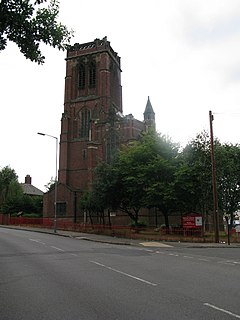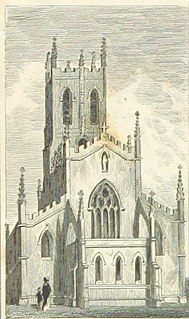
William Butterfield was a Gothic Revival architect and associated with the Oxford Movement. He is noted for his use of polychromy.

Key Hill Cemetery,, originally called Birmingham General Cemetery, is a cemetery in Hockley, Birmingham, England. It opened in 1836 as a nondenominational cemetery, and is the oldest cemetery, not being in a churchyard, in Birmingham. The principal entrance is on Icknield Street to the west, with a secondary entrance on Key Hill to the north. The cemetery contains the graves of many prominent members of Birmingham society in the late 19th century, to the extent that in 1915 E. H. Manning felt able to dub it "the Westminster Abbey of the Midlands".
Hockley is a large village and civil parish in Essex in the East of England located between Chelmsford and Southend-on-Sea, or, more specifically, between Rayleigh and Rochford. It came to prominence during the coming of the railway in the 1890s and at the 2001 census had a population of 13,616 people, reducing to 9,616 at the 2011 Census, many of whom commute to London. The parish of Hockley itself has a population of 8,909, while the urban area runs into the neighbouring parish of Hawkwell. Hockley railway station serves the village.

Sir Arthur William Blomfield was an English architect. He became president of the Architectural Association in 1861; a Fellow of the Royal Institute of British Architects in 1867 and vice-president of the RIBA in 1886. He was educated at Trinity College, Cambridge, where he read Architecture.

William White, FSA (1825–1900) was a British architect, noted for his part in 19th-century Gothic Revival architecture and church restorations. He was the son of a clergyman and great nephew of the writer and naturalist, Gilbert White of Selborne.

Hockley Heath is a large village and civil parish in the Arden area mostly within the Metropolitan Borough of Solihull, West Midlands, England, incorporating the hamlet of Nuthurst, with a history dating back to the year 705 AD as a wood owned by Worcester Cathedral. The parish, known as Nuthurst cum Hockley Heath, is to the south of the West Midlands conurbation, 12 miles (19 km) southeast of Birmingham 5.5 miles (8.9 km) from Solihull town centre and 12.5 miles (20.1 km) north of Stratford-upon-Avon. The village forms part of the border with Warwickshire and the District of Stratford-on-Avon to the south, with some parts of the village on either side of the border. According to the 2001 census, the parish had a population of 6,771, being measured at the 2011 Census as 2,038.
St Saviour's Church, St. Savior's Church, Church of St Saviour, or variants thereof may refer to:
Bishop Ryder Memorial Church, Birmingham, was a parish church in the Church of England in Birmingham from 1838 to 1960.

St Francis of Assisi Church is a Roman Catholic Parish church in Birmingham. While the church is located between the Lozells and Hockley parts of the city, the parish covers most of Handsworth. It was founded in 1840, originally as a chapel in the nearby listed building, St. Mary's Convent designed by Augustus Pugin.

St Anne's Church is a Roman Catholic Parish church on Alcester Street in Digbeth, part of the city centre of Birmingham. It was founded by Saint John Henry Newman in 1849. It was moved to a new building in 1884 designed by London architects Albert Vicars and John O'Neill, who also designed St Hugh's Church in Lincoln, and helped design St Peter's Cathedral in Belfast.

Bishop Latimer Memorial Church, Winson Green is a Grade II* listed parish church in the Church of England in Winson Green, Birmingham.

St Silas' Church, Lozells is a Grade II listed redundant parish church in the Church of England in Birmingham now used by the Triumphant Church of God.
St Stephen the Martyr's Church, Newtown Row is a former Church of England parish church in Birmingham.

St George in the Fields, Hockley is a former Church of England parish church in Birmingham. Built in 1822, it was enlarged in the late 19th century and demolished in 1961. The tomb of architect Thomas Rickman remains a listed structure on the site.
All Saints’ Church, Hockley, originally known as All Saints’ Church, Nineveh, is a former Church of England parish church in Birmingham.
St Matthias’ Church, Farm Street, Birmingham is a former Church of England parish church in Birmingham.
St Nicolas’ Church, Lower Tower Street, Hockley is a former Church of England parish church in Birmingham.
St Margaret's Church, Ledsam Street, Ladywood is a former Church of England parish church in Birmingham, England.
St Edward's Church, New John Street West, Hockley is a former Church of England parish church in Birmingham.
St Chrysostom's Church, Park Road, Hockley is a former Church of England parish church in Birmingham.










